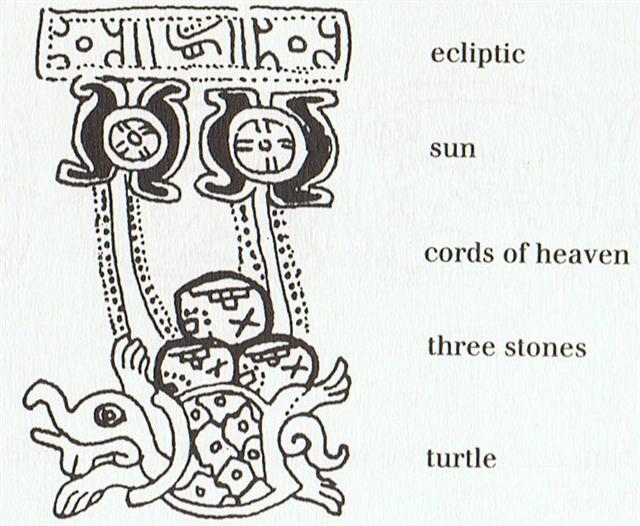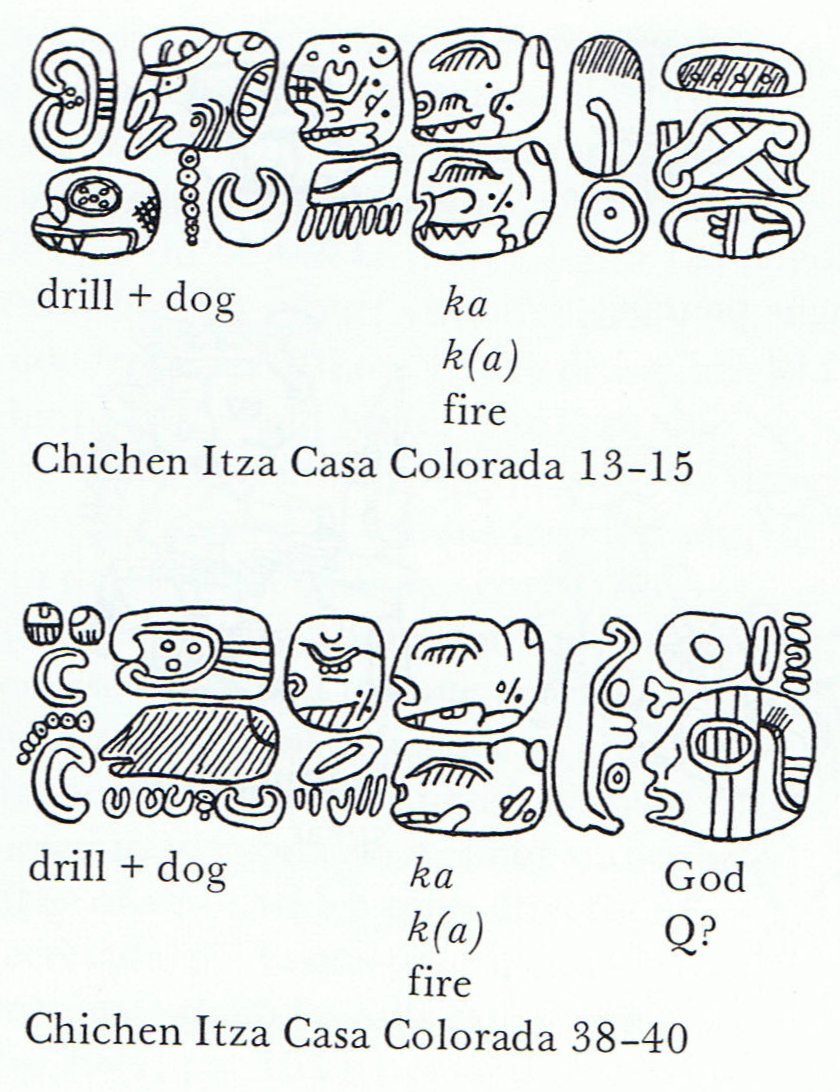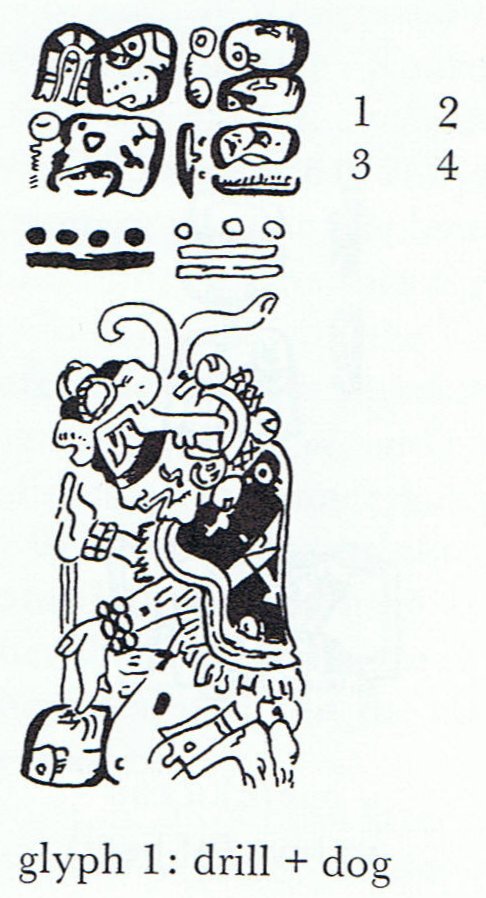|
TRANSLATIONS
Man is the only animal capable of making fire, in all other respects he does not stand above the other animals. Knowing this, making fire becomes more important than all other activities.
"It should be stated right now that 'fire' is actually a great circle reaching from the North Pole of the celestial sphere to its South Pole ..." (Hamlet's Mill)
On Easter Island the concept probably existed, because the pattern of the months indicates this:
|
1st quarter |
2nd quarter |
3rd quarter |
4th quarter |
|
He Anakena (July) |
Tagaroa uri (October) |
Tua haro (January) |
Vaitu nui (April) |
|
Te Pei |
Te Pou |
Tama |
One Tea |
Mahatua |
Taharoa |
Nga Kope Ririva |
Te Pu Mahore |
|
Hora iti (August) |
Ko Ruti (November) |
Tehetu'upú (February) |
Vaitu potu (May) |
|
Hua Reva |
Akahanga |
Hanga Takaure |
Poike |
Hanga Hoonu |
Rangi Meamea |
Te Poko Uri |
Te Manavai |
|
Hora nui (September) |
Ko Koró (December) |
Tarahao (March) |
He Maro (June) |
|
Hatinga Te Kohe |
Roto Iri Are |
Pua Katiki |
Maunga Teatea |
Peke Tau O Hiti |
Mauga Hau Epa |
Te Kioe Uri |
Te Piringa Aniva |
The kuhane journey explains the sacred geography of the island. The 'zero' station are the three rocks standing outside the southwest corner, Nga Kope Ririva:
| Kope Lad, lass, youth, young man or woman; he-oho te kope ra'e Ko Ira, the first youth, Ko Ira, went; pehé korua ga kope? How are you, lads? Koho-mai korua ko ga kope, ka-maitaki korua ga kope! Welcome to you, lasses, what beautiful lasses you are!
Kope tugutugu, youth T. Pau.: kope, string, filament. Ma.: kope, to bind in flax leaves. Churchill. |
The 'youths' (kope) are not necessarily lads, they could be lasses. By a remarkable coincidence the three hearth stones of Mayan creation have 'cognates' on Easter Island. Rocks are stones. Three rocks determine the beginning of the moon half year. They should be lasses.
The word ririva is more difficult to understand. First we have to identify the meaning of riva:
| Riva 1. Good (in general). 2. To be well, healthy: e-rivariva koe, keep well. 3. To treat someone well; to put something in order: aana-á peaha e-rivariva nei, perhaps that's him himself who keeps it in good order like this. 4. Kindness: te rivariva o te Atua mo tatou, God's kindness for us. 5. Usefulness, advantage, good; mo ai te rivariva? ta'e mooku, moona-á for whose good is it? not mine, but his. 6. Possible; ana rivariva, if possible; ekó rivariva, impossible. 7. Ironically: ku-rivariva-ana ó? is that good? (of course not). Rivarivaga, good thing, good luck; ana ta'e hakarogo-mai korua ki taaku kî, ina ekó rava'a te rivarivaga e korua, if you do not listen to my words you will not have good luck. Rivariva-haga, good, benefit; to turn out well (a song, a piece of work, etc. Vanaga.
Calm, modesty, health; to satisfy, to restore, to convert; tae riva, coarse, imperfect, uncertain, inconvenient, inconsistent, unseemly, inefficacious, inopportune, insignificant, dishonest, filthy; noho tae riva, indecent; riva ke, to make famous; riva maoa, correct; riva mo tere, navigable; riva atu, progress; riva kia ku, interest; riva no iti, convalescence; mea riva, seemly; vanaga tae riva, confused speech; ina kai riva, uncertain; e ko riva, incurable. Rivaga, goodness, quality; rivaga ke, wonderful, marvelous. Rivariva, neatness, effect, seasonableness, magnificence, excellence, curiosity, elegance, loyalty, good, well, neat, handsome, charming, decent, delicate, excellent, flourishing, exquisite, good looking, commendable, loyal, magnificent, majestic, opportune, reasonable, affable, pious, agreeable, pleasing, holy; tae rivariva, dishonesty, illegal, unworthy; igoa tae rivariva, nickname; rivariva ke, illustrious, better, best, precious, remarkable; tagata rivariva, devout; rivariva atu, to excel; mea rivariva, to delight, to deserve; hakatu rivariva, fine appearance; rivariva maitai, good; rivariva noa, moral, perfect, precious, rich. Rivarivaga, perfection; rivarivaga ke, pomp. Hakariva, happiness, attention, operation; to be happy, to rejoice, to make famous, to govern, to rule, to operate, to adorn, to cure; rara hakariva, to intermeddle. Hakarivaga, joy, gladness. Hakarivariva, deliberation, explanation, judgment, justification, admonition, agreement, paraphrase, process, receipt, petition for pardon, reparation, resolution, restoration, condemnation; to condemn, to correct, to judge, to set in order, to organize, to refute, to govern, to administer, to arrange, to assign, to complete, to compose, to deliberate, to develop, to explain, to justify, to adjust to, to accomodate, to plead, to prepare, to resolve, to retrace, to simplify, to care for, to stipulate, to convert, to verify, to translate, to tell a story, to moralize, to plot, to join, to reason, to remedy, to preach, to sharpen, to make ready, to avow, to conciliate, to free of difficulties, to clear away, to inquire, to intervene, to smooth, to traffic, to mitigate, to gormandize; hakarivariva ki toona reoreo, to drive mad; hakarivariva ki te kahu, toilet; tagata hakarivariva, arbiter, umpire, interpreter. Hakarivarivaiho, to modify, to renew, to rectify, to reform. Churchill. |
To simplify matters we can focus on the meaning of the intensified variant rivariva:
... Rivariva, neatness, effect, seasonableness, magnificence, excellence, curiosity, elegance, loyalty, good, well, neat, handsome, charming, decent, delicate, excellent, flourishing, exquisite, good looking, commendable, loyal, magnificent, majestic, opportune, reasonable, affable, pious, agreeable, pleasing, holy ...
Then there is a 'prepositional' ri-, which suggests the female characteristic of twisting together ('catching'):
| Ri 1. Mgv.: ri, a string, a girdle, to tie together. Sa.: li, the sennit lashing of canoe outriggers. Mgv.: rino, to twist a thread between the forefinger and thumb. Ta.: nino, to twist, to spin. Mq.: nino, id. Ma.: rina, a twist of two or three strands. 2. Ta.: ri, to hang. Ha.: li, to hang by the neck. Churchill. |
The cycle of the sun must be tied to that of the moon:
It is a season, I imagine, of 'wasting away' (of sun) - ririo (or pau) - together with a reappearance of the shining (ririko) moon:
|
Ririo |
Mgv.: ririo, to close up (of dry leaves), to
waste away (of men). Ta.: ririo, dried up, shrunk. Churchill. |
|
Riko |
Mgv.: ririko,
to shine, to glitter. Ma.: riko,
to dazzle, to flash. Churchill. |
The three rocks standing out in the water represent the three phases of the moon emerging in the west at the beginning of the month. The first night of the new moon was Ohiro:
| Hiro 1. A deity invoked when praying for rain (meaning uncertain). 2. To twine tree fibres (hauhau, mahute) into strings or ropes. Vanaga.
To spin, to twist. P Mgv.: hiro, iro, to make a cord or line in the native manner by twisting on the thigh. Mq.: fió, hió, to spin, to twist, to twine. Ta.: hiro, to twist. This differs essentially from the in-and-out movement involved in hiri 2, for here the movement is that of rolling on the axis of length, the result is that of spinning. Starting with the coir fiber, the first operation is to roll (hiro) by the palm of the hand upon the thigh, which lies coveniently exposed in the crosslegged sedentary posture, two or three threads into a cord; next to plait (hiri) three or other odd number of such cords into sennit. Hirohiro, to mix, to blend, to dissolve, to infuse, to inject, to season, to streak with several colors; hirohiro ei paatai, to salt. Hirohiroa, to mingle; hirohiroa ei vai, diluted with water. Churchill. |
I hesitate to draw into the argument all the various comments in Barthel 2 regarding the calendar and the geography of Easter Island - it would become too complicated and it would disturb my own reflections. I think I can manage on my own. But one point, far from obvious, must be introduced:
"The two RAP. names of stars [he kope riva and he pou] delimit the first third of the way to the residence of the king. For all the names in the first third of the list, the use of the definite article (te, pl. nga) is characteristic.
The last third of the way to Anakena is different from the preceding eight pairs of place names because of the difference in direction (south/north and east/west). This distribution of characteristics leads one to believe that the path of the dream soul with its twenty-four names is divided into three segments. Assuming such a division, it turns out that the real distance of each of the three segments (Motu Nui - Te Pou, Huareva - Poike, and Maunga Pua Katiki - Maunga Peke Tau O Hiti) is about the same - that is, approximately 10 km by air." (Barthel 2)
The dog star, Sirius, was named He Pou. I have not found what star was meant by He Kope Riva, but I bet it was the Belt of Orion (or some other triplet of stars very close), the three stones needed to light the new fire (of the young moon):

Restructuring the year according to a moon perspective and the suggestions in Barthel 2:
|
1st tertial |
2nd tertial |
3rd tertial |
|
Vaitu nui (April) |
Hora iti (August) |
Ko Koró (December) |
|
Nga Kope Ririva |
Te Pu Mahore |
Hua Reva |
Akahanga |
Pua Katiki |
Maunga Teatea |
|
Vaitu potu (May) |
Hora nui (September) |
Tua haro (January) |
|
Te Poko Uri |
Te Manavai |
Hatinga Te Kohe |
Roto Iri Are |
Mahatua |
Taharoa |
|
He Maro (June) |
Tagaroa uri (October) |
Tehetu'upú (February) |
|
Te Kioe Uri |
Te Piringa Aniva |
Tama |
One Tea |
Hanga Hoonu |
Rangi Meamea |
|
He Anakena (July) |
Ko Ruti (November) |
Tarahao (March) |
|
Te Pei |
Te Pou |
Hanga Takaure |
Poike |
Peke Tau O Hiti |
Mauga Hau Epa |
The dog star, Sirius, marks the final of the 'season of creation'. It is located at the end of the darkest corner of the year, where it becomes obvious that a new light is needed.
The dog occurs together with the fire drill in the Maya texts:
 
"... The close association of the dog with fire is well established ..." (Kelley)
Anakena is the beautiful beach of the king on the north side of the island. How come the month Anakena then is located in the dark part of the year? Te Pei and Te Pou are located on the southern (dark) coast.
I now think I have understood the reason. The great circle 'fire' (the date line) must cut the island in a north-south direction. The beginning of a year must connect the north (Anakena) with the south (Te Pou). The new fire must start at the same time in the north and in the south. There must be a conjunction across the whole island.
|



